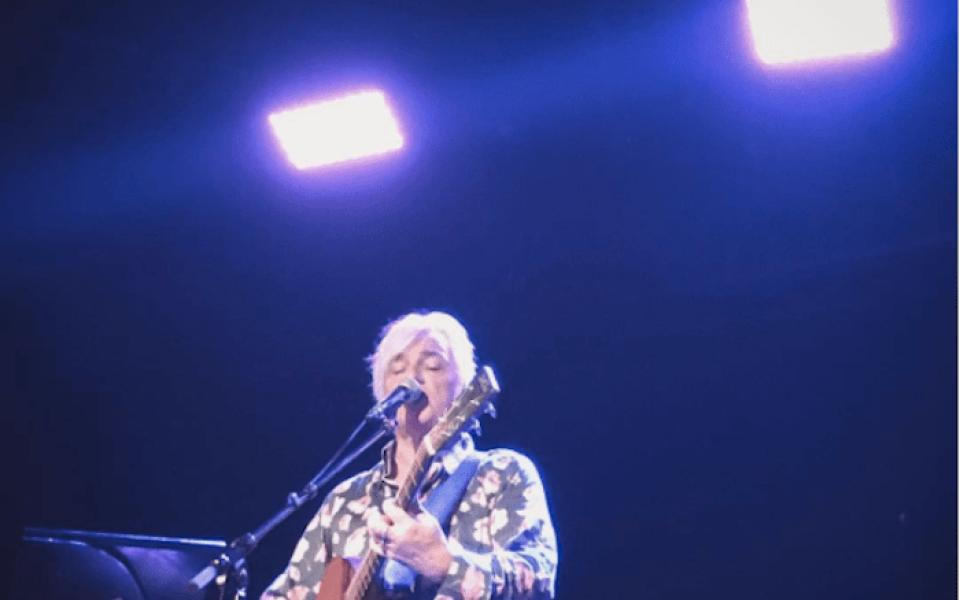“The first time I played here, I had a tour bus, brown hair and lots of cassettes,” Robyn Hitchcock said from the ArtsCenter stage in Carrboro on Sunday night. “I miss the cassettes.”
Hitchcock pushed his now-white hair back from his forehead and wondered aloud how the squat former strip mall — “the square behind Milltown” — had managed to survive since his first trip to Carrboro, when seemingly everything else has been rebuilt, paved over or given a Google-era facelift. He dedicated the next song, “My Favorite Buildings,” to anything that might’ve been demolished that he didn’t know about.
If the neon green gigography on RobynWare, a long-abandoned Hitch-centric website, is accurate, his first appearance in that square was on April 27, 1990, when he played an 18-song set that spanned an already impressive career. Twenty-seven years later, he’s cut the mullet that brushed against his collar and has further established himself as an inimitable songwriter, psychedelic statesman and undeniable influence on your favorite band’s favorite band.
Hitchcock is also as prolific as an aphid colony — which may be one of the few insects he’s never name-checked in a song. Last month, he released his 21st album, the self-titled Robyn Hitchcock (on Hillsborough’s own Yep Roc label), a collection of mostly plugged-in songs that are among his most personal. They might be some of his most optimistic, too.
Hitchcock’s carefully crafted lyrics often explore the underside of the human condition, pointing out its absurdities and illustrating how the familiar and the freakish fit together. He carefully runs his fingertips along the gossamer threads that connect us, while tucking some of his sharpest observations behind references to wasps, skulls, reptiles, ghosts and the occasional corpse. (He’s the only songwriter whose liner notes could come with an illustrated taxonomy.)
On Sunday night, he and his Fylde acoustic played requests that had been submitted on Facebook and Instagram, pulling 20 selections from 13 different records and two outtake compilations, from solo albums and those he’d made with his three bands: the Soft Boys, the Egyptians and the Venus 3.
With hundreds of songs to choose from, there were several surprises, including Egyptians-era “Luminous Rose” and “Airscape,” the Clint Eastwood-inspired “(A Man’s Gotta Know His Limitations) Briggs” and the deep cut “A Skull, A Suitcase and a Long Red Bottle of Wine” (“If you requested this, you’ll be glad to hear it,” he said. “If you didn’t, it won’t last long.”) Regardless of what he played, someone in the crowd was mouthing along with every word: The man beside me practically twitched out of his dad jeans when he heard the opening notes of “She Doesn’t Exist,” from the long-out-of-print Perspex Island record.
As an aside, that’s the one that started it for me. When I was a college freshman, I spent a lot of time at the now-extinct Record Exchange, trying to trade stacks of scuffed ska CDs for something less stupid. I’d just picked up all of my unsold Mighty Mighty Bosstones discs when a sullen, smoking employee pressed play on Perspex Island. Before the opening track had ended, I’d asked what it was and if I could buy it. That CD changed my life and, in the years since, it has survived moves, breakups and it’s been in a cardboard box with my other belongings when I was escorted out of more than one office building.
Back in Carrboro, Hitchcock filled the spaces between songs with observations about everything from relationships to Eastwood’s Magnum Force to politics. “When they said it’s a free country, they meant it’s free for any bozo to come in and hijack it,” he said, introducing “1974.” That was one of two songs that sounded more relevant than ever; it chronicles the entire year, from the “ghastly mellow saxophones” on the radio to the uncertainty of watching Nixon circle the drain. (“And as Nixon left the White House/You could hear people say/’You’ll never rehabilitate that mother, no way.”)
The other was the Soft Boys’ eternally vicious “I Wanna Destroy You,” which he dedicated to the politicians he despised. “This isn’t a folk song,” he said, but even an acoustic version gave those lyrics (“Cause if you want to fight/Then you’re just dying to get killed”) as much politically charged menace as Dylan’s “Masters of War.”
For me, the highlight was hearing the new songs from Robyn Hitchcock (The Album) including the Johnny Cash-ish “I Pray When I’m Drunk” and the muscular first track “I Want to Tell You What I Want.” The latter is a hopeful 21st Century wishlist, for “world peace, gentle socialismo, no machismo.” All we need is L-O-V-E — he spells it out — because that’s the one thing that iParts, AI and binary code can’t replace. (“Eight billion zeros is still zero/If you’ve got no heart.”)
Maybe something will change in that familiar parking lot, or happen to the strip mall or to the stage at the ArtsCenter before he comes back again. It may look the same, but for those of us in the crowd on Sunday night, he made it all feel different — even without his cassettes.
Join the First Amendment Society, a membership that goes directly to funding TCB‘s newsroom.
We believe that reporting can save the world.
The TCB First Amendment Society recognizes the vital role of a free, unfettered press with a bundling of local experiences designed to build community, and unique engagements with our newsroom that will help you understand, and shape, local journalism’s critical role in uplifting the people in our cities.
All revenue goes directly into the newsroom as reporters’ salaries and freelance commissions.


Leave a Reply